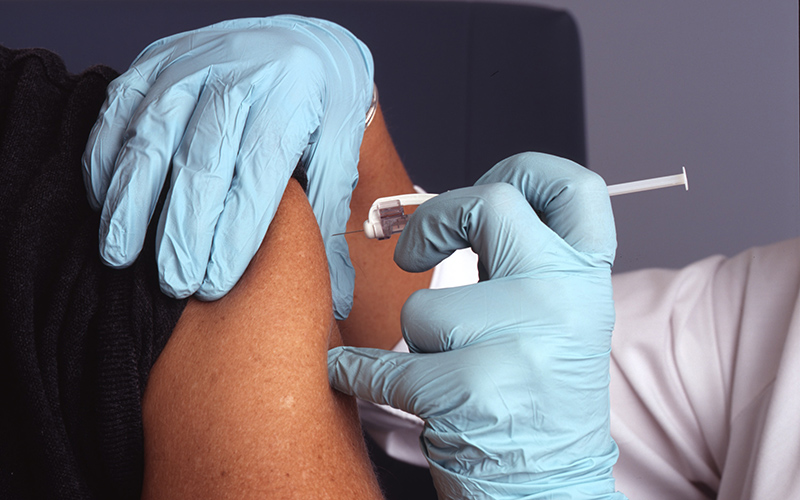Search
Research
Estimating the impact of test–trace–isolate–quarantine systems on SARS-CoV-2 transmission in AustraliaAustralian states and territories used test-trace-isolate-quarantine (TTIQ) systems extensively in their response to the COVID-19 pandemic in 2020-2021. We report on an analysis of Australian case data to estimate the impact of test-trace-isolate-quarantine systems on SARS-CoV-2 transmission.

News & Events
BCG vaccine does not protect against COVID-19 in healthcare workersA world-leading international trial examining the immune boosting benefits of the tuberculosis vaccine, BCG, has found it does not protect healthcare workers against COVID-19.

News & Events
Sophisticated modelling shows WA’s Omicron outbreak still has months to runWestern Australia’s Omicron outbreak is far from over, with new modelling showing the number of total infections is only at its half-way point.

News & Events
Australia’s first DNA-based COVID-19 vaccine study set to begin at The Kids Research Institute AustraliaAustralia’s first needle-free, gene-based COVID-19 vaccine study will be spear-headed in WA by The Kids Research Institute Australia thanks to almost $6 million in Coronavirus Research Response funding announced by Health Minister Greg Hunt.
Research
Short-Term Active Safety Surveillance of the Spikevax and Nuvaxovid Priming Doses in AustraliaAustralia commenced administration of the Spikevax (Moderna mRNA-1273) COVID-19 vaccine in August 2021 and Nuvaxovid (Novavax NVX-CoV2373) in January 2022. This study describes the short-term safety profile of priming doses of the Spikevax and Nuvaxovid vaccines given between September 2021 and September 2023.
Research
‘I leave most of the decisions up to her:’ Gendered parenting, un/equal decision work, and responsibility for COVID-19 vaccinationVaccination scholarship focuses on how privilege, individualized choice and ‘intensive’ and ‘natural’ parenthood – often motherhood – lead people to delay or not vaccinate their children. Recently, examining parents’ vaccination responsibilities – and the inequalities in paid employment and unpaid care work underpinning them – has become important to understand COVID-19.
Research
Facilitating knowledge transfer during Australia’s COVID-19 vaccine rollout: an examination of ‘Functional Dialogues’ as an approach to bridge the evidence–policy gapOur interdisciplinary team initiated a project to inform the COVID-19 vaccination programme. We developed a novel research co-creation approach to share emerging findings with government.
Research
World Society for Pediatric Infectious Diseases calls for action to ensure fair prices for vaccinesThe eradication of smallpox is considered one of the greatest achievements of humankind, thanks to vaccination. The widespread availability of childhood vaccines has substantially reduced childhood morbidity and mortality. Devastating infections, such as polio, have almost disappeared due to vaccination. In 2021, it was estimated that vaccination against ten selected pathogens will have averted 69 million deaths between 2000 and 2030. Increases in vaccine coverage and introduction of additional vaccines should reduce lifetime mortality by 72% in the 2019 birth cohort. However, access to vaccines that prevent life-threatening and disabling infectious diseases remains unequal.
Research
Modeling COVID-19 disease processes by remote elicitation of causal Bayesian networks from medical expertsCOVID-19 is a new multi-organ disease causing considerable worldwide morbidity and mortality. While many recognized pathophysiological mechanisms are involved, their exact causal relationships remain opaque. Better understanding is needed for predicting their progression, targeting therapeutic approaches, and improving patient outcomes. While many mathematical causal models describe COVID-19 epidemiology, none have described its pathophysiology.
Research
Sense of Coherence (SOC) of Italian healthcare workers during the COVID-19 pandemic: analysis of associated factorsThe COVID-19 pandemic has posed significant challenges for healthcare workers worldwide, potentially affecting their sense of coherence (SOC) and overall well-being. This study aimed to identify factors associated with different levels of SOC among healthcare workers, exploring demographic characteristics, work-related factors, changes in relationships and social habits, and the overall well-being.
